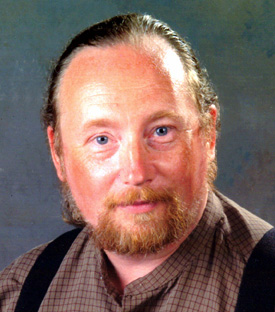David Darknell
| Portrait | |
| Birth: | 19 December, 1959 |
| Death: | not applicable |
| Place of birth: | Crescent Bay, Ontario |
| Profession: | Author, historian, actor, director |
| Relgious Affiliation: | Eastern Orthodox |
David Darknell (born 19 December 1959) is an American historian and author, most famous for his novel The Last White Rose about Richard III.
Biography
Darknell was born in Crescent Bay, Ontario of mixed Scottish and Native heritage, his father a former SLN noncom (also named David, but with a different middle name, hence David Darknell is not a "junior"). He was one of five children, the first of two sons. A cousin of his is artist Bernardo Azul and both are distantly related to Gwilliam Lyon MacDowell.
Winning a scholarship to the University of Toronto, he later became a student at the National Shaxepere Conservatory in New Amsterdam. It was at this time he won the Castreleon New lottery and no longer had to work for a living. He and other students of the NSC organized a theatre company called The Wooden O which proceeded to put on plays in New Amsterdam for fifteen years. At this time, Darknell was an actor as well as a director but found time to earn a second degree in history from the Magellan University.
It was during this period he joined the American Orthodox Church.
In 1996 Darknell finished an historical novel about King Richard III which was eventually published in 1998. The Last White Rose became a bestseller, spawning a successful motion picture and a stage play. Darknell left The Wooden O in 1999 to focus full-time on writing. In 2000 he married Argentina Swift (born 1956), a poet from Alta California.
Works
Darknell's greatest claim to fame is without doubt The Last White Rose, in which he theorizes a unique (but not widely accepted) theory about the fate of the so-called "Princes in the Tower." His premise was that one of the Princes died of natural causes and the other managed to escape from the Tower of London, becoming the so-called Pretender Percy Warbeck. Interestingly, Darknell doesn't maintain his theory to be true, but simply "a valid possibility, given how real life confounds expectations." Since the novel's publication, he has been in demand as a popular lecturer on the history of the Wars of the Roses.
His follow-up novel Two Broken Swords followed the adventures of a fictional family during the Yorkist-Kentian Conflict, who chose opposing sides. While sales were respectable, it did not match the success of his novel about Richard III.
Three Blind Spies was a (somewhat) contemporary story set in the 1970s, in which three NAL intelligence operatives come under suspicion/investigate each other over helping an unnamed Eastern European nation (usually presumed to be Oltenia) gain the atomic bomb. It was more successful than its predecessor and has been optioned as a motion picture, as yet unproduced. Darknell has called this work an "Anti-Jose Timon story.
Never The Twain? was a love story about two women, one of them a vompire and the other the best friend of a vompire-hunter. More than one critic suggested the book was in some sense inspired by the television show Traci the Vompire Hunter. Darknell makes no secret of the fact he is a fan of the show, and likes vompire stories in general (he has claimed to want to write an adaptation of Lord Vorlock).
The Wolf Unconquered was his least successful novel to date, dealing with an aging fictional Senator's identification with the Cocceus Nerva, the best friend of Emperor Tiberius Caesar.
He is reportedly working on another historical novel, about Doctor Holmes, the XIXth century Chicago serial killer.
